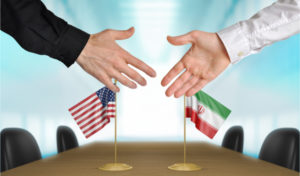
By David Carillet @ Shutterstock.com
CIA Director Mike Pompeo has opened a channel of communications with his counterpart in Iran, Major General Qassem Soleimani, with a warning that Iran would be held accountable for any attacks on American forces in Iraq by Iranian-controlled troops. This was a warning, but it was better than no dialogue at all. Perhaps it can be the beginning of a conversation rather than the end. Daniel DePetris explains at The American Conservative. He writes (abridged):
Speaking at the annual Reagan National Defense Forum, CIA Director Mike Pompeo recently disclosed that he sent a direct communication to Iranian Major General Qassem Soleimani, the longtime commander of the Islamic Revolutionary Guard’s Quds Force division responsible for Iran’s overseas paramilitary and intelligence activity. “What we were communicating to him in that letter was that we will hold he and Iran accountable for any attacks on American interests in Iraq by forces that are under their control,” Pompeo told the audience. “We wanted to make sure he and the leadership in Iran understood that in a way that was crystal clear.”
“Jaw-jaw is better than war-war”: As British Prime Minister Winston Churchill argued, talking with an enemy to prevent a major military conflict from happening is a far better option than skipping dialogue altogether and catapulting toward a more violent and unpredictable relationship.
A military conflict between Washington and Tehran would be devastating to the Middle East. Diplomacy is the only mechanism states have at their disposal to resolve international disputes peacefully and prevent conflicts from spiraling into violent catastrophes.
U.S.-Iran contacts today are too limited: The Trump administration’s policy on Iran during its first year has been overly dependent on sticks, like economic sanctions and massive weapons sales to regional allies, and too short on engagement. There is no balance in America’s Iran policy.
It will be up to the Trump administration to decide whether Pompeo’s message to the Iranians was a one-off, isolated occurrence meant for the cameras or the beginning of a more established channel to communicate red lines, prevent mistakes, and, above all, keep U.S. foreign policy options open.
Read more here.
If you’re willing to fight for Main Street America, click here to sign up for my free weekly email.





